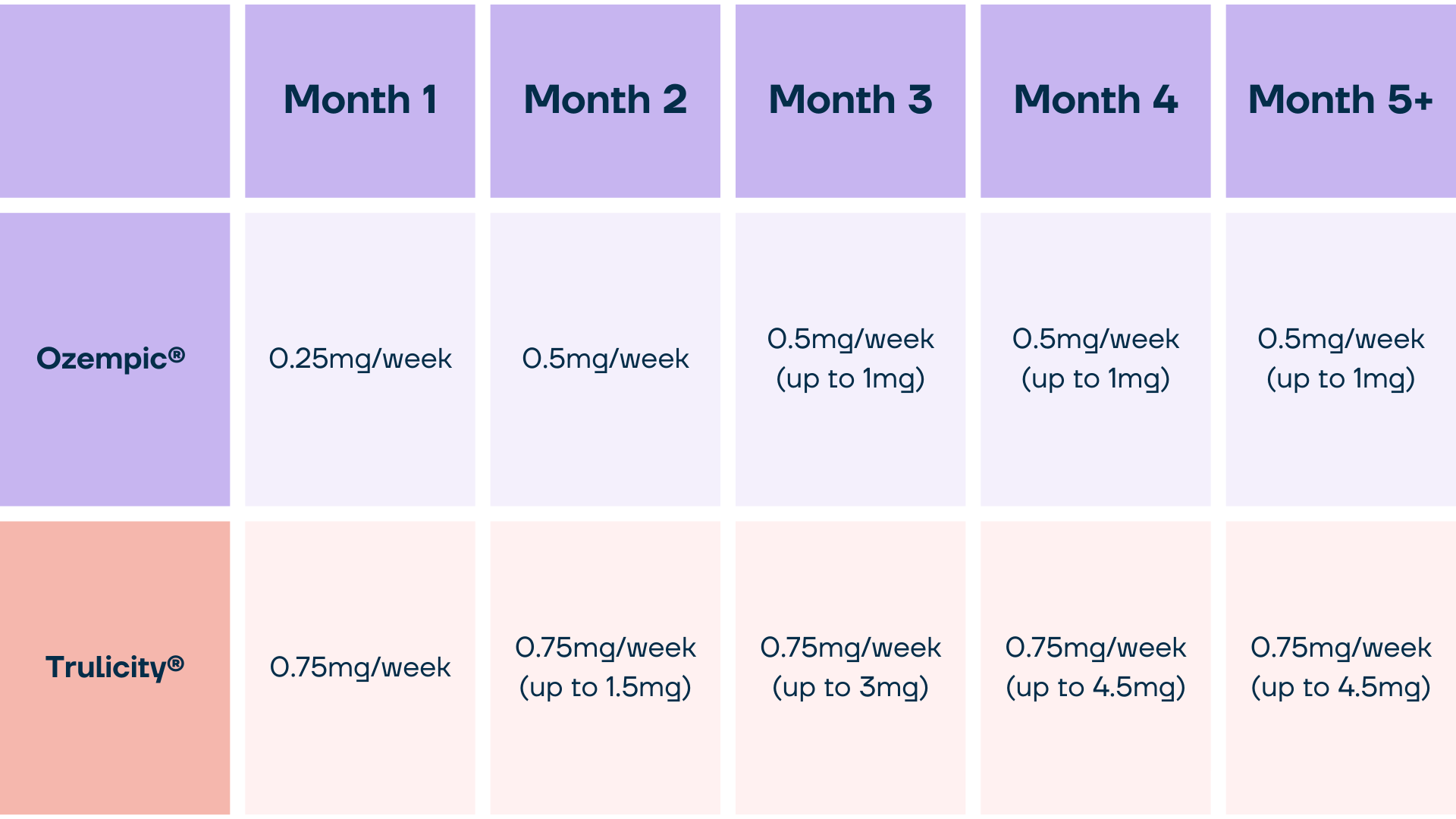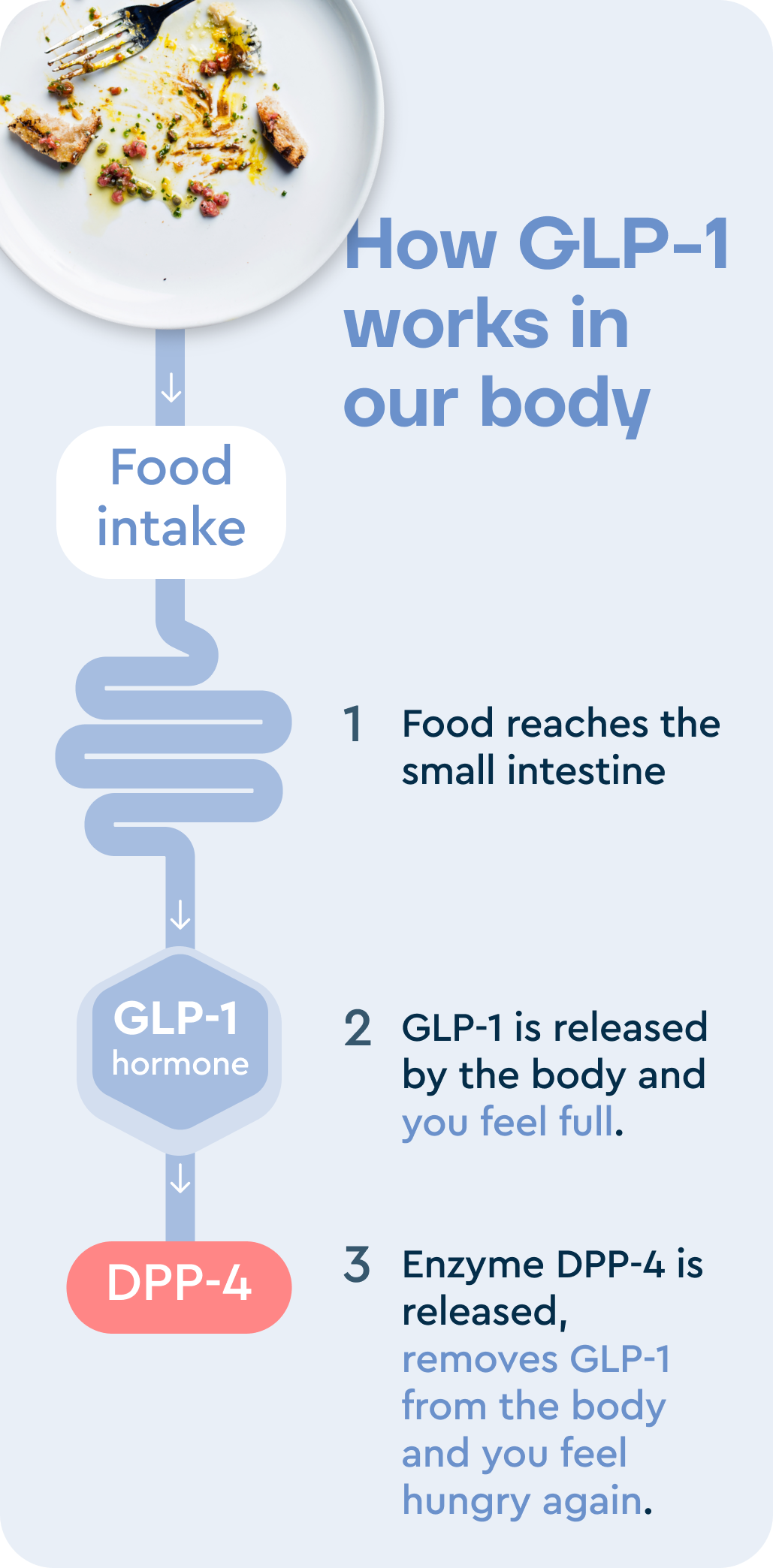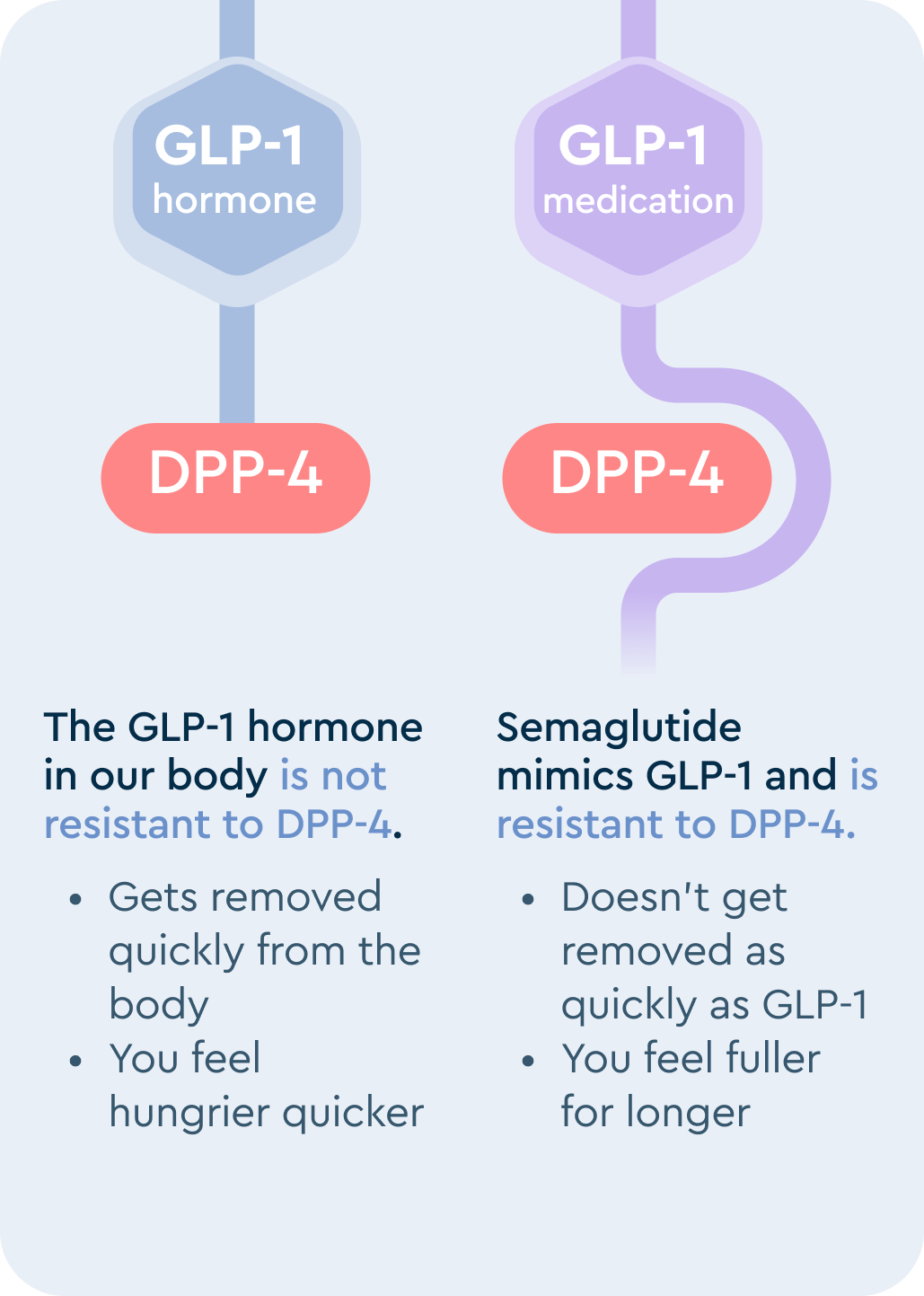Jump to: How do Ozempic and Trulicity work? | Ozempic vs Trulicity: Which is better for weight loss? | Ozempic vs Trulicity: Which is better? | Take home message
Ozempic and Trulicity are medications approved to treat type 2 diabetes in the UK.
Neither medication is available off-label for weight loss after the UK government introduced new measures to protect the supply for people living with type 2 diabetes.
Ozempic and Trulicity are GLP-1 receptor agonists, medications that reduce appetite to support weight loss and improve blood glucose control through various mechanisms.
Novo Nordisk manufactures Ozempic, and Trulicity is by Eli Lilly. The active ingredient in Ozempic is semaglutide, and dulaglutide in Trulicity. Ozempic and Trulicity are available via prescription, although their eligibility criteria differ.
Ozempic is generally more effective for weight loss than Trulicity. However, 1 mg Ozempic and 4.5 mg Trulicity support similar improvements in HbA1c (average blood sugar levels).
So, if you’re looking for a medication to help you lose weight and improve your blood sugar levels, Ozempic will lead to more weight loss and blood sugar reductions.
However, individual responses to medications vary between individuals. Be mindful of side effects and contact your healthcare team to determine the appropriate medication and dosage.
Both medications have similar dosing schedules and are administered once a week.
The main difference is the amount of medication used, with Trulicity rising to 4.5 mg if necessary and Ozempic up to 1 mg.
Ozempic and Trulicity dosing schedules:

Not a magic pill
Weight-loss injections are designed as additional tools for healthy lifestyle change and shouldn’t be considered as lifelong medications.
Instead, they should be used to help you kickstart your weight-loss journey whilst you focus on building new, healthy habits.
Consider the use of antidepressants for people living with depression. They’re not designed to cure the condition. Instead, they’re designed to allow room for therapy to treat the condition’s underlying cause.
Mounjaro and Wegovy are similar. These medications can help silence food-related thoughts and also give you a boost of confidence with more immediate weight-loss results.
This helps to buy you the time and headspace to understand why your body may have struggled to lose weight previously, and to build new long-term healthy habits.
The core focus of our medication programmes are to calm down the feeling of food noise, lower your cravings, and to allow you to build healthier habits to keep the weight off for good.
The ultimate goal is to make losing weight feel second nature.
Second Nature’s medication programme
Second Nature currently provides Mounjaro as part of our Mounjaro weight-loss programme.
Why should you choose Second Nature over other medication providers if you’ve decided to try Mounjaro (assuming you’re eligible)?
For peace of mind.
Second Nature has worked with the NHS for over 6 years providing weight-loss programmes across the UK.
While our Mounjaro weight-loss programme is private and not currently used by the NHS, we’ve built the programmes focusing on scientific evidence, patient safety, and data security.
We hope that our 6+ years of working with the NHS and building a track record of effective weight-loss results will give you peace of mind to give us a try.
1) How do Ozempic and Trulicity work?
When we eat food, our gut releases hormones that help the body regulate hunger and blood sugar levels.
GLP-1 (glucagon-like peptide-1) is one of these hormones and improves insulin function to lower blood sugar levels and delays gastric emptying, decreasing appetite.
GLP-1s also communicate with the brain’s appetite control centre, the hypothalamus, to lower hunger and food-seeking behaviour.

Trulicity and Ozempic mimic the actions of the hormone GLP-1 and are known as GLP-1 receptor agonists or GLP-1s.
They are effective because they remain in the bloodstream for longer than the hormone GLP-1. When GLP-1 is released from the gut, only 25% makes it into the bloodstream and is rapidly removed from the system.
It’s removed from our body by an enzyme called DPP-4. GLP-1s like Ozempic are resistant to DPP-4, and their levels remain elevated in the bloodstream for 4-7 days.
After 4-5 weeks on Ozempic, the body reaches a steady state where its level remains consistent in the bloodstream rather than rising and falling.

Key points:
- GLP-1 receptor agonists (GLP-1s) are a class of medications that mimic the actions of the hormone GLP-1, which helps regulate hunger and blood sugar levels
- GLP-1s help the pancreas release more insulin, delay stomach emptying, and reduce appetite
- Ozempic and Trulicity mimic the action of GLP-1 and decrease appetite and blood sugar levels
2) Ozempic vs Trulicity: Which is better for weight loss?
Ozempic (semaglutide) leads to more significant weight loss than Trulicity (dulaglutide).
However, it’s worth noting that neither Ozempic nor Trulicity are approved for weight loss in the UK and are only approved for people living with type 2 diabetes.
A study randomised 1201 participants to one of four groups:
- Ozempic 0.5mg
- Ozempic 1mg
- Trulicity 0.75mg
- Trulicity 1.5mg
The study was designed to investigate the impact of the medications and the different doses on weight loss and HbA1c (average blood sugar levels).
The results showed that Ozempic was more than twice as effective in supporting weight loss when comparing similar doses.
Ozempic 0.5mg resulted in a weight loss of 4.6kg after 40 weeks, compared to 2.3kg with Trulicity 0.75mg. Ozempic 1mg led to a weight loss of 6kg, compared to 3kg with Trulicity 1.5mg.
However, this study didn’t investigate the highest dose of Trulicity, which is 4.5mg. Results from other human trials suggest Truclity 4.5mg supports weight loss of 4.7kg after 36 weeks, 1.3kg less than Ozempic over a similar period.
So, research suggests that Ozempic leads to more significant weight loss than all available doses of Trulicity.
Ozempic vs. Trulicity: Which is better for HbA1c?
Research has shown that Ozempic 1mg typically supports an HbA1c reduction of 1.8 percentage points, compared to 1.4 with Trulicity 1.5mg.
1.8 percentage points of HbA1c is equivalent to a reduction of around 20mmol/mol, compared to 1.4 which is around 15mmol/mol.
Again, this study didn’t compare Ozempic 1mg to the highest available dose of Trulicity. Research on Trulicity 4.5mg has shown it can reduce HbA1c by 1.77 percentage points, or around 18mmol/mol.
Key points:
- Ozempic leads to more significant reductions in weight than Trulicity
- Ozempic 1mg and Trulicity 4.5mg lead to similar reductions in HbA1c
- Neither medication is available for weight loss in the UK and can only be prescribed for individuals living with type 2 diabetes
3) Ozempic vs. Trulicity: Which is better?
Effectiveness
Ozempic supports more significant weight loss compared to Trulicity; both medications show similar improvements in blood sugar levels at their highest doses.
So, if you’re someone living with type 2 diabetes, you might consider Ozempic as a better option as it will lead to more weight loss alongside blood sugar reductions.
However, everyone responds to medications differently, and you may adhere to one or the other better depending on how you feel while taking the medication.
Ozempic and Trulicity side effects and safety
All medications have possible side effects, particularly if you live with other health conditions.
Some will be mild but uncomfortable, such as cramping, and others will be more severe, such as shortness of breath. You must report any side effects you experience to your doctor and healthcare team when on medications.
Ozempic appears to have a similar safety profile to Trulicity’s lower doses.
One study reported adverse GI events in 43% of patients receiving Ozempic 0.5mg, 44% of patients receiving Ozempic 1mg, 33% receiving Trulicity 0.75mg, and 48% receiving Trulicity 1.5 mg.
However, the highest dose of Trulicity increases the number of side effects. Another study reported adverse GI events in 66.4% of patients receiving Trulicity 4.5mg.
Dulaglutide (Trulicity) may be easier to adhere to
Research suggests slightly more people discontinue Ozempic than Trulicity due to adverse events, with around 13% of patients stopping Wegovy because of adverse events, compared to around 9% on Trulicity.
Further supporting this, real-world data from a U.S. clinical practice on patients living with type 2 diabetes suggests that more people adhere to dulaglutide than semaglutide.
After 6 months, 63.4% of patients prescribed dulaglutide were still taking the medication, compared to 47.8% on semaglutide. At 12 months, it was 54.4% for dulaglutide and 43.3% for semaglutide.
Cost
Ozempic
To get Ozempic and the injectable pens required for four weeks of treatment will cost between £180-£300 in the UK. However, it’s no longer available off-label for weight loss.
Getting Ozempic on prescription through the NHS will only cost you the prescription fee of £9.95 in England.
Trulicity
The cost depends on where you’re purchasing it from and how long you intend to use the medication. However, to purchase the medication and injectable pens required for four weeks would cost around £126, or around £1520 per year.
Getting Trulicity on prescription through the NHS will only cost you the prescription fee of £9.95 in England.
Key points:
- Ozempic is more effective than Trulicity at supporting weight loss, while both medications support a similar reduction in HbA1c at their highest doses
- The safety profile of Ozempic and Trulicity is pretty similar, and both medications lead to common GI side effects like nausea.
- However, research suggests that people living with type 2 diabetes may adhere to dulaglutide better than semaglutide.
- However, individuals will vary in their medication response, so choose the right one for you
- Ozempic and Trulicity are both available in the UK on prescription if you’re living with type 2 diabetes
Take home message
The recent innovations in GLP-1 medications are pretty remarkable and have caused quite a stir in the world of healthcare.
We’re in new territory where obesity and type 2 diabetes medications treat an underlying cause instead of merely treating the symptoms to support better management.
However, these drugs shouldn’t be seen as miracle cures; they’re not designed to be used for life.
They’ve been designed to be taken alongside lifestyle changes that will enable you to eventually come off the medications and maintain your lower weight for the long term.
GLP-1s are safe and effective for most people in the short to medium term, but we don’t have long-term data to be sure they’re not causing severe adverse effects elsewhere.
At Second Nature, we’re not against using medications to support people in making healthy changes and reducing their risk of chronic disease.
However, we don’t recommend using medications as a reason not to make healthy lifestyle changes. The causes of obesity and type 2 diabetes aren’t merely rooted in biology but also psychology and sociology.
With these medications, you may lose weight and reduce blood sugar levels. But will you be happier? Will you be more fulfilled? Will you be content with your life and social relationships?
For that, you may need to consider a lifestyle change.
Please note: We generally recommend speaking with your GP/doctor before you start taking any new medication like Mounjaro. If you do sign up for Second Nature's Mounjaro programme, then we'll also send your GP a letter to let them know you've started a medication-supported weight-loss journey.






